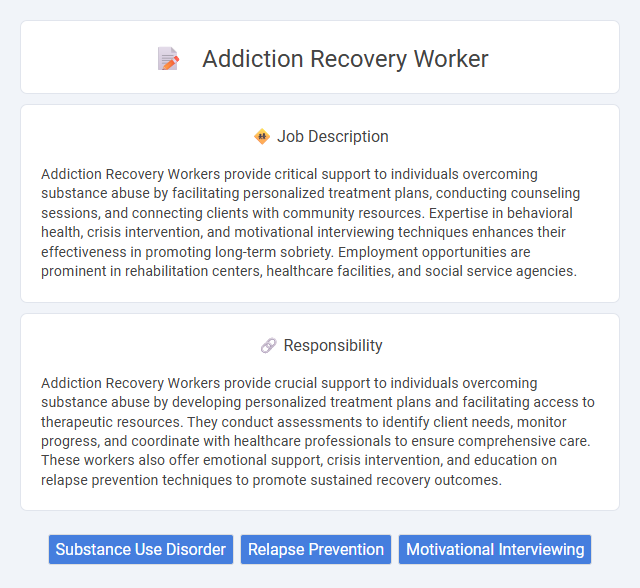
Addiction Recovery Workers provide critical support to individuals overcoming substance abuse by facilitating personalized treatment plans, conducting counseling sessions, and connecting clients with community resources. Expertise in behavioral health, crisis intervention, and motivational interviewing techniques enhances their effectiveness in promoting long-term sobriety. Employment opportunities are prominent in rehabilitation centers, healthcare facilities, and social service agencies.
Individuals experiencing substance use disorders or behavioral addictions may find meaningful support through an Addiction Recovery Worker's guidance, though those who are highly empathetic and possess strong communication skills will likely be more successful in this role. People with personal experience of addiction recovery might be well-suited given their potential insight and understanding of challenges faced by clients. However, those who struggle with setting boundaries or managing emotional stress might find this work particularly demanding and less fitting for their capabilities.
Qualification
Addiction Recovery Workers must possess a combination of formal education and practical experience, typically requiring a minimum of a high school diploma, with many roles preferring candidates holding a degree in psychology, social work, or counseling. Certification such as Certified Addiction Counselor (CAC) or similar credentials enhances job prospects and ensures adherence to industry standards. Strong communication skills, empathy, and knowledge of substance abuse treatment methodologies are crucial for effective client support and relapse prevention.
Responsibility
Addiction Recovery Workers provide crucial support to individuals overcoming substance abuse by developing personalized treatment plans and facilitating access to therapeutic resources. They conduct assessments to identify client needs, monitor progress, and coordinate with healthcare professionals to ensure comprehensive care. These workers also offer emotional support, crisis intervention, and education on relapse prevention techniques to promote sustained recovery outcomes.
Benefit
An Addiction Recovery Worker probably offers significant benefits, including providing emotional support and guidance to individuals overcoming substance abuse. They may facilitate access to essential resources, improving clients' chances of sustained recovery. This role likely enhances community well-being by promoting healthier lifestyles and reducing relapse rates.
Challenge
Addiction Recovery Workers likely face significant challenges in managing the complex needs of individuals battling substance abuse, requiring resilience and adaptability. Navigating emotional stress and maintaining professional boundaries may pose ongoing difficulties in this role. The probability of encountering resistance or relapse among clients suggests a need for persistent support strategies and continuous skill development.
Career Advancement
Addiction Recovery Workers play a pivotal role in supporting individuals through substance abuse treatment and rehabilitation, with opportunities for career advancement through obtaining certifications in counseling or social work. Gaining specialized skills in trauma-informed care and mental health can lead to positions such as case manager, clinical supervisor, or program coordinator. Continued professional development and experience increase eligibility for leadership roles within healthcare organizations and community support agencies.
Key Terms
Substance Use Disorder
Addiction Recovery Workers specialize in supporting individuals with Substance Use Disorder (SUD) by providing counseling, developing personalized recovery plans, and facilitating access to rehabilitation services. They employ evidence-based interventions such as cognitive-behavioral therapy (CBT) and motivational interviewing to address the psychological and behavioral aspects of addiction. Effective addiction recovery work contributes to reducing relapse rates and improving long-term sobriety outcomes for clients.
Relapse Prevention
Addiction Recovery Workers play a critical role in relapse prevention by developing personalized coping strategies and support plans tailored to each client's unique triggers and challenges. They utilize evidence-based interventions such as cognitive-behavioral therapy (CBT) techniques and motivational interviewing to empower clients in maintaining long-term sobriety. Continuous monitoring and collaboration with healthcare professionals ensure timely adjustments in relapse prevention plans to optimize recovery outcomes.
Motivational Interviewing
Addiction Recovery Workers utilize Motivational Interviewing techniques to engage clients in the change process, fostering intrinsic motivation for sobriety. Mastery of empathetic listening, open-ended questioning, and reflective responses within Motivational Interviewing enhances clients' readiness to overcome substance dependence. These skills significantly improve treatment outcomes by supporting personalized recovery plans tailored to individual client needs.
 kuljobs.com
kuljobs.com